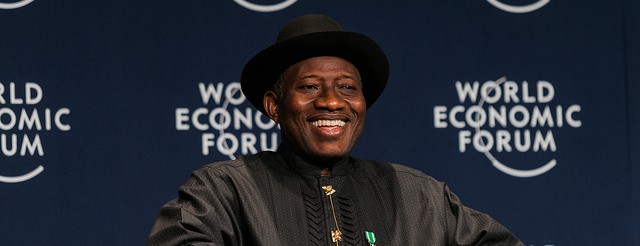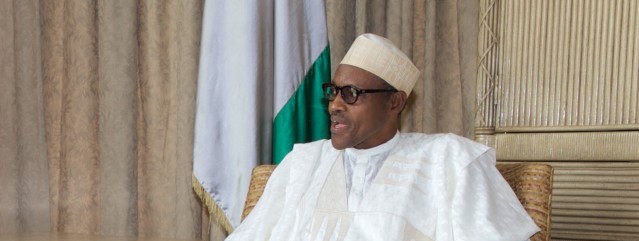On 14 February, Nigeria holds what is likely to be the most keenly fought presidential elections in her history. However, what is in contention in these elections may not be the superiority of one ideology over the other, as understood in the western democracies. Rather, what is becoming evident is that the election is about two quarrelsome camps, each seeking a popular mandate to determine the fortunes (or the lack thereof) of nearly 170 million Nigerians.
The leading presidential candidates, General Muhammadu Buhari (rtd.) of the All Progressives Congress (APC) and incumbent Goodluck Jonathan of the Peoples Democratic Party (PDP), are commonly depicted in a variety of stereotypical terms – the former as northern, militarist, ostensibly ascetic, jihadist; the other as southern, civilian, indolent, religiously moderate. So too are the camps they represent.
The issue that ordinarily should shape the election is the voters’ perception of the candidates’ likely performance in the areas of concern to Nigerians such as power supply, security, corruption, jobs, social welfare, etc. Yet, as the elections near, the two greatest worries for Nigerians and friends of Nigeria are whether or not the elections will be held as scheduled, given last week’s call by the National Security Adviser for a postponement, and how the contestants will respond to the results announced by the electoral body. The violence that ensued in the wake of the largely peaceful 2011 polls is still very fresh in the minds of many Nigerians.
Nigerian politicians are legendary for disputing any election result that does not proclaim their own victory. Concomitantly, Nigerian politics remains in its pre-ideological phase with warlords largely determining the vote count. Elections are fought and won not on the basis of the superiority of agendas or platforms presented to voters. Rather, underperforming incumbents seek votes by raising the spectre that what comes after them could be worse; while the opposition busies itself with laying landmines to prove that the incumbent has not performed well. Nowhere is this scenario better demonstrated than with the issue of the insurgency in the northeast which has heightened the profile of insecurity more than at any other time in the country’s history of elections.
The 2015 election is, however, remarkable in one important regard: it is arguably the first election in a long while whose outcome was not a foregone conclusion in favour of the incumbent. The elite consensus that normally crystallizes around the candidature of an incumbent on the eve of a general election has been notably absent this time around. Today, the APC, a non-ideological platform cobbled together by politicians disaffected with the Jonathan presidency, presents a formidable opposition, giving rise to a genuine contest whose results are still largely indeterminate. Standing mainly on an alliance of the core north with the states of the southwest, one of the several casualties of this coalition has been the relegation of one of the principal concerns of the southwest political establishment i.e. the clamour for restructuring the country’s federal system as an irreducible minimum condition for resolving the country’s many problems. It would seem that the current political leaders of the southwest may have concluded that forgoing an aspiration that had been the raison d’être of southwest politics over the years is a wise and sufficient price to pay for seeing off Jonathan and becoming part of the power at the federal level. How this works out remains to be seen.
A scenario of “vote for us or else” – which suggests that if you vote for Buhari then you can kiss the oil from the Niger Delta goodbye, and if you vote for Jonathan then the insurgency in the north will continue – seems to be what Nigerians are being offered. But the credibility of a threat of shutdown of oil facilities is questionable, considering that the Jonathan administration is also said to have alienated some groups in the Delta region. At the same time, the perceived incompetence of the Federal Government in handling the insecurity issue, which has exposed many people in the affected areas to misery, seems to be working to temper historic misgivings about northern entitlement to federal power which many regard as a key driver of the Buhari challenge. Declining oil prices, which may last much longer than previous shocks, and currency devaluation could have unintended and uncomfortable consequences both for the incumbent and the challenger.
As journeys go, the Nigerian political transition, wobbly though it is, remains on course. The past sixteen years* have witnessed the longest run of unbroken civilian rule in the country’s history. Viewed from this perspective, the 2015 elections could therefore be seen as just one of the stops on the way. But could it be the terminus? This question really encapsulates the issue that friends of Nigeria should concern themselves with in a robust manner as the elections near.
Kayode Samuel is a former government official in Nigeria and a visiting fellow at the Institute of Commonwealth Studies, University of London. He is the author of “Political Transition in Nigeria, 1993-2003: Commentaries on selected themes” (Malthouse Press, Lagos, 2010).
*An election timeline can be found in Thurston, Alexander, “Background to Nigeria’s 2015 elections”, CSIS Africa, January 2015, pp.10-12
All text links selected by Africa Research Institute
Related content:
Blog: Africa in 2015 – 10 things to consider
Interactive: 2015 African Elections Resource Page with an election map, timeline and further reading








